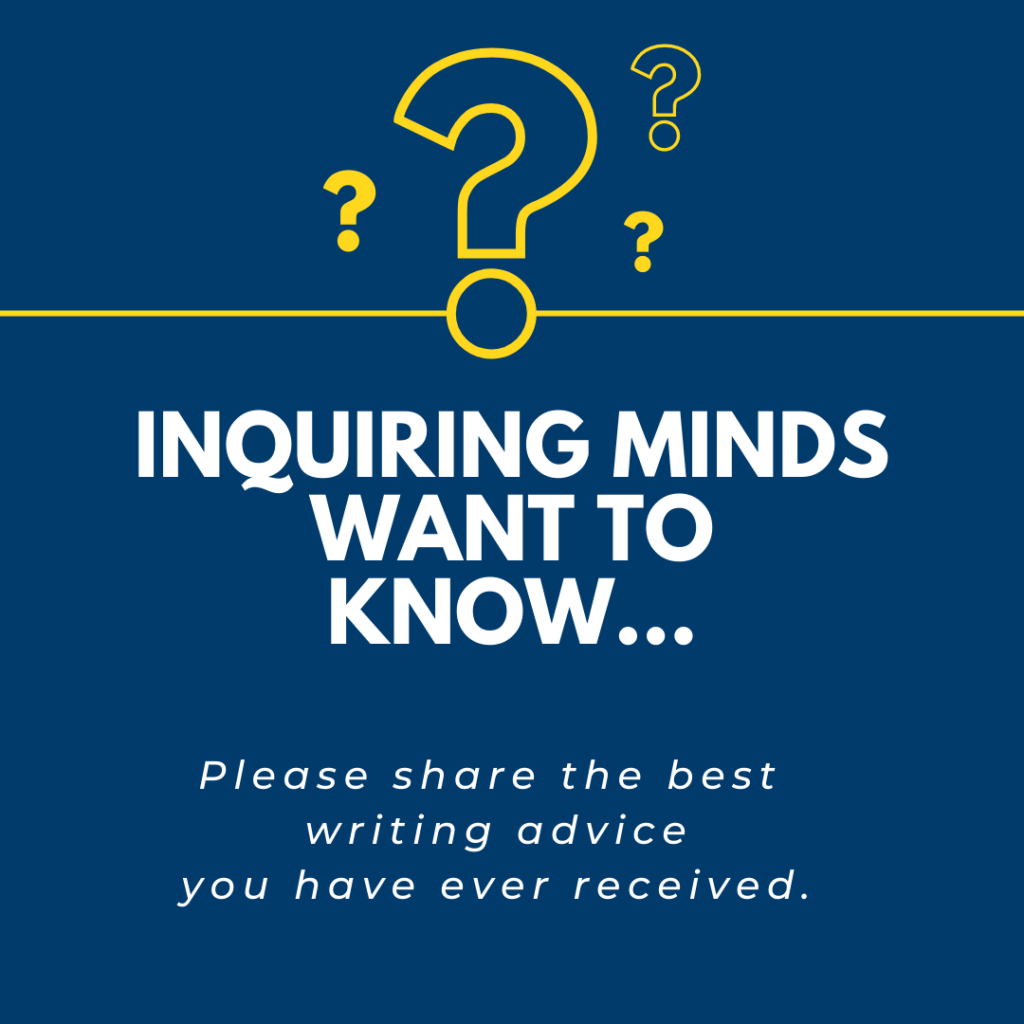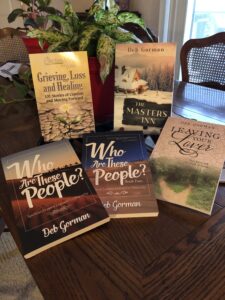Today’s guest post is by Deb Gorman. Thanks, Deb.
A picture is worth a thousand words. Study the graphic carefully.



Deb Gorman lives in the Pacific Northwest and writes stories of redemption and reconciliation. Her next book, No Tomorrows, is due to be released this fall. You can connect with her at her website: debggorman.com

I’ve been writing (and getting advice about it) for ~60 years. I heard Bradbury speak about a half dozen times. I’ve read many books on writing, including Asimov’s memoirs, and many novels. Most of that advice, whom I heard it from, and where I read it, have faded into the mists of yesteryear. So I said to myself, “Self, if I were you, (and I am), I would just give the advice I’ve given most often to new writers.” It is this:
ᒍOIᑎ ᗩ ᗯᖇITEᖇᔕ’ ᗯOᖇKᔕᕼOᑭ.
Great advice, JG.
Deb’s on Pacific time. She’ll be here to respond soon.
I’m here! Yawn…waiting for coffee to brew.
Good early morning, Deb.
Thanks for coming up with the question for this morning, and doing this guest blog.
You heard Bradbury speak? That is cool! One of my favorite authors ever!
I agree, Vera.
My mentor, Edith Battles, and her husband Willis would pick Ray up and drive him to Southwest Manuscripters, where he spoke every June. He missed only one SWM speaking engagement in 30 years. He was fond of us because SWM was the first club to ask him to speak during his early years. He was unique.
Ray’s advice was to type the first thing that came to mind and then ask questions about that. One day, he typed, “In the nursery . . . ” What about the nursery? What’s in there? Is it something dangerous? What would be the most dangerous thing you could find there? This ultimately became “The Veldt,” and the dangerous thing therein was a pair of young human minds, freed of constraint by modern technology.
Good Friday morning, J.
Great advice. That should surely be at the top of any writer’s list of great advice.
Have a great day…
Good morning, Deb and Steve.
Answer: Write every day. From Ernest Hemingway through Bill Plant, my lifelong friend and mentor.
You gotta start somewhere and sometime. Here and now would be good.
Have a great weekend!
Good morning, Joe.
Such important writing advice, and yet so easily interrupted by all the “emergencies” that try to intrude. Thanks for the reminder.
Have a great weekend!
Hi Joe!
Hmm…I think I’ve heard that maxim somewhere…here!
And Steve’s right, life has a way of getting in the way sometimes. But, the upside is that those interruptions can become stories.
Have a great day, Joe…:)
“Don’t publish too soon.” Actually, I think I learned that here, at TKZ, about 5 years ago.
Great advice, Vera. And so important when a writer has decided to indie publish. Those first few books that are tucked away in the closet, unpublished, are great reminders of your important advice.
Thanks for participating.
Hey Vera . . . thanks for that advice.
Actually, I don’t *think* I’ve heard that one. But, so true.
Have a good start to your weekend!
Happy Friday, all!
“Write every day”.
NOT because I do this–at this point in my life it’s virtually impossible. But it’s the best advice because it taught me that you have to stay in the flow of your story. And you can’t do that (or most can’t) by writing something on your story once every six months. No matter how you schedule your writing each week, you need to stay in the flow of your story for best results.
Great point, BK. I struggle with the same thing. And even having another creative endeavor can steal some of the subconscious creative planning when one is not writing. How did Asimov keep all those stories going at the same time?
Thanks, BK.
But we’re so happy you have that “other creative endeavor”, Steve! 🙂
Asimov never got writer’s block; there was always something he could sit down and write on from where he left off. How? Genius, that’s how.
Trying again…
Good word, BK! Writing every day is right down there in the bedrock of our skill level.
Thanks!
Just start.
So true, Michelle. Like any journey, one step at a time.
Great tip. Thanks.
Yes! If I don’t start, I won’t ever type the magic words “The End”.
Thanks, Michelle!
Write to a quota. It’s too easy to say, “I’ll write for two hours” and get lost in thought. But if you set a word goal, you’ll know what to do. I do it per week, divided by six days, one day off; that way if you miss a day, you can make it up on other days). I advise writers to figure out what they can comfortably do in a week, with their schedule and other matters. The bump that number by 10% and go for it. Keep track of your words on a spreadsheet. If you don’t make your goal one week, forget it and start fresh on the next one.
Carpe Typem.
Thanks for a very important point, Jim I knew you would remind us of that one. Should we name it the JSB Quota System?
All kidding aside, there’s nothing like the word goal to make one focus and write when our time is limited.
No surprises, here, JSB.
You’ve proved your own advice over an over again.
Thanks for that! 🥳
Well, this isn’t strictly writing advice but it’ll do.
I am in a professional group of guitar amp technicians (somebody snuck me in when the bouncer wasn;t looking) and back when I was still in my paint by numbers phase I asked a really dumb question, I guess looking for someone to bail me out of a jam. Or something.
So, one of the OGs (Original Gangsters) of the group who forgot more about this trade than I’ll ever know said to me “You’re a smart guy. Figure it out for yourself.”
That stuck with me and I apply it to my learning the craft. It works too.
Excellent point, Robert. If we have to sweat it out, try some things that don’t work, until we find what does, we make some excellent eureka discoveries that will make our work even better.
I love that experimentation process.
Good one!
Hey, Robert! I love it!
In fact, my father gave me the same advice way back when I was trying to fix my bike, at about 11 years old. I wanted him to do it for me, but he said I should figure out what needed to be done first, then he’d help me.
Best advice ever!
Thanks for joining in this morning…
It’s just incredible the number of newbies in groups who ask basic questions they need to research and read about a LOT, but throw their helpless selves out there for someone who knows more to take pity on them and GIVE them the answer.
Advice: you’ll get much more usable help if you do the obvious stuff yourself.
Learn story structure; it’s the magic bullet of storytelling. Second best was when I learned the three dimensions of character.
Great question, Deb! Hi, Steve. *waves*
A woman after my own heart.
Hi, Sue. Great advice.
We need to understand the building blocks, and how they fit together, before we can build something (successfully) ourselves. Then we can experiment.
Have a great weekend!
Morning, Sue!
Those magic bullets are important, for sure. And I hadn’t thought about the “three dimensions of character”.
Great tips.
Thanks for ringin’ the bell this morning. 🤓
I don’t recall who said it, but I read an interview where the writer said, “It’s impossible to edit a blank page.” or words to that effect. Another gem was “The first draft is for your eyes only.” Took a lot of pressure off. If anyone knows who the authors of either of these quotes are, I’d love to be able to credit them.
Thanks, Joe, for those great points. We’ll do some looking and see if we can find some answers.
Thanks.
Nora Roberts and Jodi Picoult
Thanks, Terry!
Great tip, Joe! For writing and for life.
I can’t improve on or change what isn’t there . . . yet.
Thanks!
I’ve received so much good writing advice it’s hard to say just one, but I’ll try. I don’t remember who said it but it was said at a writing conference: “Quit if you can, but if you can’t, learn how to do it right—study and learn the craft then sit your butt in the chair and write.”
Great one, Patricia. That’s three writing tips rolled into one.
Thanks for sharing.
Addendum: Deb has been hit by the “Denied for too many attempts” Gremlin. She will keep trying and respond to your comments as soon as she is able.
Here I am again! Hope we can fix this soon.
Thanks, Patricia-if quitting isn’t an option, then we need to knuckle down and do the work. Learn, write, rinse and repeat.
Have a great weekend!
“There is only one rule: affect the reader emotionally. The rest are all guidelines”
Great question, Deb!
Thanks, Dale. Good one. It’s all about emotion and affecting the reader. How true.
Have a great weekend!
Yes, Dale…as a reader, I want to feel something…anger, sympathy, fear, doesn’t matter. Make me feel.
Hmm, as an author, I should take my own advice.
Thanks for the reminder.
Join a critique group.
That commits you to turn in XX pages per week/month. The group makes you accountable.
Learn from their feedback and rewrite.
When you analyze other’ writers’ work, it sharpens skills that you can apply to your own writing.
Good morning, Debbie.
Your advice is excellent. It rolls three things into one. You’re forced to write to a quota. You learn from the feedback. And you sharpen your skills when you analyze other writers’ work.
Thanks! Excellent advice and tips.
Have a great weekend!
Hi Debbie…yes, but this is something I haven’t done…yet!
Thanks for chiming in!
Read a lot and read widely.
Reading improves our writing through osmosis and keeps the creative well full to the brim. Reading outside your genre gives you great new perspectives and insights.
I see too many people online (Reddit) say they’d love to write a novel despite never reading one.
Excellent point, Philip. I believe it was Stephen King who said that if we haven’t read widely we shouldn’t (or are unable to) write.
Keeping the creative well full – excellent metaphor.
Thanks for the advice.
I love this tip, Philip, because it gives me permission to indulge myself in my fave pastime. Yes!
Have a great weekend.
Read.
Yes! Excellent, Terry!
Thanks.
Yes, Terry! Read, read, read!
Read. Study. Write. And never give up.
Great advice, Kay. It sounds like something a college professor would say. And, oh, so true. And that “never give up” part is the “practice, practice, practice.”
Thanks, Kay, for the words of wisdom!
Kay, I’ve been trying to reply to you for hours now… 🙁
“Study”. Yes, if I’m not learning as an author, I’m missing the whole boat shebang!
Have a great day, my friend!
Not sure where this came from, but I’ll pass it on: Know the rules so when you break ’em, you’re doin’ so intentionally.
Good one, Garry. It reminds me of Picasso and his painting.
Thanks for a great addition to our list!
From Yours Truly.
http://killzoneblog.com/2023/07/know-the-rules-before-you-break-them.html
Thanks, Jim.
Hi Garry!
Now this is one I can sink my bookish teeth into…never was a rule-breaker as a kiddo, but I sure am now.
Have a great day.
This is what helps me. Not sure it’s for everyone. I take a daily walk of about four miles each morning in a golf course community. During that walk, I’ve found that I go into a meditative-like state. Some of my best ideas, plots or key points for the book I’m currently writing comes into my mind. Is it the refreshing atmosphere of the outdoors, the birds tweeting or scenery, I’m not sure. Whatever it is, the walk clears my head. I breath in the fresh air and when I return home, I immediately jot them down and other times, I stop at a bench, sit and record those thoughts on my cellphone.
Wonderful. Suzanne. I like your idea. I get the same benefit from doing outside work in my wood lot. There is something about nature that inspires awe in its magnificence.
Thanks for contributing today.
I love this, Suzanne. Walking is a staple of my day. Something about participating in life at ground level gets my imagination going.
Thanks for chiming in today, and have a great weekend.
This is the advice I quote most often to new writers about the reality of writing.
“I’m just starting [a new book] and the battle has already begun. I don’t think they ever go smoothly. It’s work. It should be work. It should be hard work. I think if you sort of sit around and wait to be inspired, you’re probably going to be sitting there a long time. My process is more about crafting, working an idea through my head to see if it’s a good concept.” Nora Roberts in an interview with the “Hagerstown Herald-Mail.”
Wow, Marilynn. That is so true. Nora Roberts would know.
Nothing of great importance is easy.
Thanks for sharing your wisdom.
Thanks, Marilyn.
Another keeper for my “Greatest Writing Advice” document.
Have a good weekend…
I think the fundamental rule is “just write” or “write every day” or “sit your ass in the chair and get to it”. These are all different ways of saying the same thing.
A writer writes. If you don’t write, you’re not a writer. Researching, plotting, mapping out stuff, thinking, daydreaming, wasting time on social media are secondary or tertiary to the task at hand.
The one great exception is reading widely and comprehensively, because this belongs to skill building and idea development.
Some folks will tell you they’d like to write but they dont read and don’t much like it. How in the heck can you practice an art for others that you yourself have no interest in?
Write. All else is vain.
A writer writes. If you don’t write, you’re not a writer.
Truth!
Thanks, Robert, and have a great day.
Wonderful advice, Robert.
“Write. All else is vain.” Nike says, “Just do it.”
Thanks for contributing!
Thanks for guest posting today, Deb.
Great questions, and lots of insightful answers.
You’re welcome…and thanks for the fun!
“Sell your book by writing the next one.”
Now, I always offer this advice: Find out if you’re a plotter or a pantser or somewhere in between on the spectrum, and then choose the books and people you learn from who are in roughly the same place on that spectrum; if not, most of the advice you get won’t work for you, and will waste your time trying to absorb it.
Plotter: someone who prefers to know where she’s going and roughly how to get there before the actual writing starts. Plotters need to know all that work will get them closer to that ending.
Pantser: someone who starts from an interesting idea, and follows where it leads. Pantsers often say if they know where the story goes, they’re NOT interested; they’ve lost the thrill of the chase and discovery.
I’m an extreme plotter.
Interesting perspective, Alicia. I like that.
I’ve heard that James Patterson is an extreme plotter. And he’s always looking for someone to write his books.
Thanks for sharing your insight.
Makes sense to this plantser! A pantser with an inkling of a plot.
👌
Thanks, Alicia!